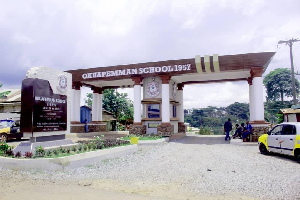- Home - News
- TWI News | TV
- Polls
- Year In Review
- News Archive
- Crime & Punishment
- Politics
- Regional
- Editorial
- Health
- Ghanaians Abroad
- Tabloid
- Africa
- Religion
- Election 2020
- Coronavirus
- News Videos | TV
- Photo Archives
- News Headlines
- Press Release
General News of Monday, 14 October 2019
Source: ISSER
ISSER to launch flagship State of Ghanaian Economy Report
If you desire to know the real state of the Ghanaian economy assessed independently by a crack team of experts in all the relevant areas, you just have to wait for a fortnight.
This is because the latest edition of the State of the Ghanaian economy report (SGER 2018) is set to be launched on October 29, 2019.
The Institute of Statistical, Social and Economic Research (ISSER), has since 1990 continued to publish one of its flagship publications titled The State of the Ghanaian Economy Report (SGER). This year, the Institute is pleased to issue the 28th edition of the publication and also present a mid-year review of the economy in time to inform the 2020 Budget preparation process.
The SGER has seven chapters, with different but inter-related topics on Ghana’s economic performance. The overview is followed by a chapter on Fiscal Developments. The rest of the report contains analytical chapters on the Financial and Monetary sector, International Trade and Payments, Agriculture, Industry, and Services and an optional chapter on the “Digitization of Tax Administration and Domestic Revenue Mobilization in Ghana”.
The motivation for continuing to publish the SGER has been due to the limited analytical information from a non-partisan perspective and our commitment to provide accurate, independent and well-researched information about Ghana’s economy.
Key highlights of the report include the following: GDP growth slowed down in line with global trends, the financial sector clean up as well as challenges with domestic revenue mobilization which severely affected capital expenditure.
Fiscal performance deteriorated compared to the preceding year but within the fiscal deficit GDP target. Other issues include low revenue mobilization associated with benchmark values and tax exemptions.
Within the monetary and financial sector, high cost of credit within the context of reduced Monetary Policy Rate (MPR) and inflation has been of great concern to households and businesses. Exchange rate depreciation and its effects on businesses and livelihood as well as liquidity challenges, incidence of deposit insurance premiums are well noted in the report.
The year under review also recorded deterioration in trade balance compared to the preceding year partly due to declining commodity prices. Will the African Continental Free Trade Area (ACFTA) affect Ghana’s trade position favourably and allay the fears of local businesses?
The date and venue for the programme are as follows:
Date: October 29, 2019 at 9.30 am
Venue: ISSER Conference Facility











